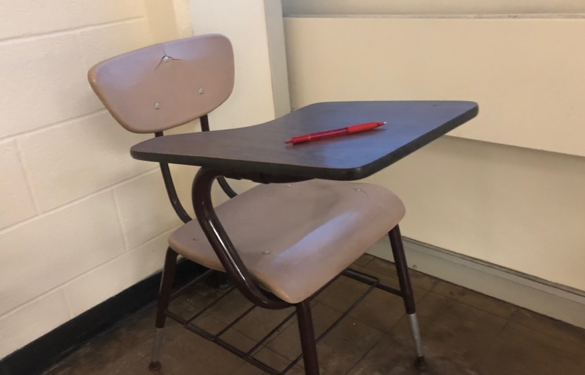By: Himdeep Singh
College is branded to be “the time of your life,” where you make lifelong friends and lasting relationships filled with adventure and fun.
Is this truly the case anymore for the majority of students?
Starting school in a new country or even a new city along with excessive social media use can lead to social isolation in students because they are constantly reminded by their devices, that they have no real face-to-face connections.
A research study on the topic of loneliness shows that students with more support from friends and significant others felt less lonely (Henninger Iv, Eshbaugh, Osbeck, & Madigan, 2016).
Another research study suggests that students who relied on family for social support correlated with higher levels of loneliness (Henninger Iv et al., 2016).
Anecdotally, I have experienced loneliness throughout high school and into college at Erie Community College and here at Daemen (during my first year) as a transfer-student.
I never understood the cause of my loneliness, but I became very fascinated with this topic and determined to find solutions. I have taken a meditative, philosophical, and scientific approach to managing this issue in my life.
A plurality of research supports the notion that loneliness can be attributed to intrinsic (distal) causes like personality, social anxiety or predisposition to mental illnesses (Twenge, Spitzberg, & Campbell, 2019).
Mr. Lamark Shaw, director of career services said that ‘we create our own loneliness through the stories we tell ourselves with the exception of a condition due to mental illness.’
Loneliness can cause higher dropout rates, low quality of sleep, low academic performance, low satisfaction with college experiences, along with lower levels of happiness.
Loneliness is an especially serious issue among college students. Young adult brains are still growing and are very malleable from the culmination of experiences they have had and will have.
Daemen College has various community supports for students including the Wildcat Wellness Committee, and a host of clubs and organizations.

Assistant professor of biology, Dr. Jon Good, says that ‘students more easily view college as a steppingstone for their careers, rather than time for personal growth.’
Dr. Good feels that ‘Daemen does a phenomenal job in being reactive to student’s needs, but we’re not that proactive (to student’s needs).’
A potential side effect of rigorous academic programs is that students may set aside forming deeper relationships due to the immediate stress of the coursework.
Daemen College has a larger demographic of commuters than residential students.
Dr. Michael Brogan, vice president of academic affairs and dean of the college states that ‘commuters do not experience the same experience and participatory engagement in all aspects compared to residents. Therefore, not feeling part of a group on campus is an extrinsic variable of loneliness.
Dr. Greg Nayor, vice president of student affairs states ‘this issue requires a multi-faceted approach because what works for one population of students is not going to work for others.’
Nayor urges students to communicate their needs to student affairs so that Daemen can implement different programs, events, and services to help resolve this issue.
Student affairs requires feedback from students to judge the effectiveness of their strategies.
A Daemen student states that ‘they like the email communication and the homepage interface for events on campus.’
However, the student says ‘there is a need for small pockets of physical spaces in order for introverts to be able to communicate one-on-one rather than going to a large space like RIC lobby or dining halls.’
Another student who is an animation major on campus states that, ‘Daemen clubs can be too specifically defined, potentially excluding other students with an interest. He continues, “it can also be hard and scary to go into a club alone without a friend.”
Due to the sensitivity of this topic many students did not want their names to be mentioned in this article, and we reserved the student’s anonymity for the purpose of respecting their wishes.
Dr. Brogan says that, ‘faculty members could be more cognizant of their classrooms and encourage groups dynamics to process active learning between each other with more enthusiasm.’
Therefore, it may be helpful to create a conversational environment around the academic topics than strict lectures in order for students to apply the topic in class and engage with each other.
This can lead to more students studying with each other by breaking the ice in classrooms and encouraging students to roam out of their comfort zones.
A fellow Daemen student in natural sciences who was a resident and now a commuter feels that, ‘Daemen could host more events off campus to engage commuters and eliminate the physical barrier which makes Daemen events less appealing to commit the time and energy for a commute.’
Mr. Shaw summarizes this issue, by stating that ‘in order to increase the impact of education on students and the world, we need to increase the network of student body on campus because human connection is essential for our success as a human race.’
If you are lonely, please know that you are not alone in your loneliness and reach out for help.
Citations
Henninger Iv, W. R., Eshbaugh, E. M., Osbeck, A., & Madigan, C. (2016). Perceived Social Support and Roommate Status as Predictors of College Student Loneliness. Journal of College & University Student Housing, 42(2), 46–59.
Twenge, J. M., Spitzberg, B. H., & Campbell, W. K. (2019). Less in-person social interaction with peers among U.S. adolescents in the 21st century and links to loneliness. Journal of Social and Personal Relationships, 36(6), 1892–1913. https://doi.org/10.1177/0265407519836170

